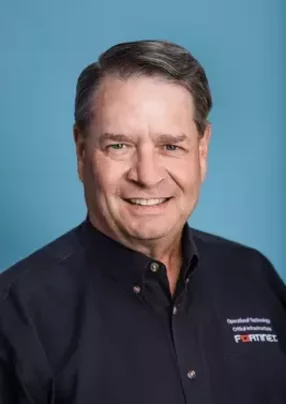
Rick Peters
CISO
Having spent almost four decades at the US National Security Agency (NSA) in a variety of managerial and executive roles, it is safe to say that Peters knows what constitutes strong cybersecurity system defense. During his long tenure, he was able to gain credentials, experience, and insight into what it takes to successfully launch a business in cyberspace. “I had the luxury of experiencing and executing missions from both the offensive and defensive sides. Post my IC career, I felt that whatever was next professionally needed to be a departure from working in the government, and private industry afforded such opportunity.” It wasn’t long before Peters joined the Fortinet team in early 2018.
Sharing a mutual desire to expand OT cybersecurity, Peters spoke with Fortinet’s leadership and was impressed by what he found: “I discovered that it was a ‘solutions first’ oriented organisation and that got me excited. If you glance at Fortinet’s patent wall, you naturally realise it’s not just talking about innovation, it is executing development to achieve it,” he recalls.
Peters is an advocate of what he calls “zero-trust access” (“I think we have to insist on earning trust in 2021”) and also behavioural-based endpoint security. “[The latter] raises the bar by recognising threats and learning from them. It gives you not just cyber resilience but a thorough comprehension of what's going on. I think that's really important: We never want to become complacent. Complacency is the enemy in this business because you’ll never reach the end destination; cybersecurity is just a continuous journey.” As such, he shares a mutual dedication to the journey of cyber resilience with Fortinet. “Too often, leaders get trapped believing they can just commit a set amount of resources to a particular problem and then consider the issue to be resolved with a point solution. In today’s business world, whether you're in IT or OT, that approach amounts to becoming complacent.”
Regarding his philosophy on great leadership, Peters says, “I've witnessed a great deal over my career, both on the commercial side and within the intelligence community. Great leaders exhibit and foster trust, and that trust can then carry through a team even during crisis situations. We all recognise that there are competing objectives and challenging technology-based problems to solve, and it's the great leaders that groom future leaders for succession; they're aware of the fact that they've got to pass the baton. Lastly, it’s very important they understand the need to be able to balance work and family. When you see someone who can accomplish these things, people value it and will seek to emulate it in their own career.”
Read the full article HERE

